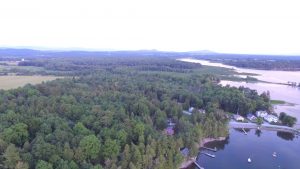Massachusetts Tree Law: When Can a Property Owner Be Liable For a Tree on Their Land?
The Massachusetts Supreme Judicial Court issued an important decision last week on Massachusetts tree law. The decision, Shiel v. Rowell, discusses a property owner’s liability for a tree on their property.
Background
The facts of this case are fairly straightforward. The parties, in this case, were two neighbors, with one bringing a lawsuit against the other for damage caused by a tree from the other’s property. This tree caused algae buildup on the other’s roof from the branches hanging over the home. The neighbor who filed this lawsuit sought money for these damages and an injunction (court order) that the other neighbor cut back the tree causing this damage.
Overview of Massachusetts Tree Law
This case presented a simple but important question for the court: when can a property owner be liable for a tree on their land?
The Court reaffirmed a long-standing rule in Massachusetts that a landowner may not hold a neighbor liable for damage caused by a neighbor’s healthy tree. Here, the algae damage to the home resulted from branches hanging over the home . . . something that commonly occurs with trees. As this was a “healthy” tree, it was not up to the tree owner to deal with this problem. Rather, the neighbor who owned the home underneath these tree branches was responsible for addressing this problem.
The Court affirmed that a property owner has a right to cut off branches, roots, and other parts of a tree that interferes with one’s property. If a property owner fails to do so, they cannot blame the tree owner for the natural damage caused by the tree.
Whether a tree is “healthy” was a critical factor in the outcome of this decision. If a tree is unhealthy, this rule of non-liability would seemingly not apply. For example, if a dead tree breaks apart and falls onto a neighbor’s home, the tree owner will not automatically avoid liability for such damage. Likely, in such a case, the owner will have liability for any resulting damage.
Practical Implications
As the Court stated in this decision, a practical lesson of this decision is the importance of maintaining one’s property. A homeowner cannot expect to obtain relief against a neighbor if they fail to address the natural problems from encroaching trees.
A word of caution about cutting down portions of a tree on your property: while it is permissible to cut back portions of an intruding tree, Massachusetts law imposes steep penalties for willfully cutting down or destroying trees on another’s land. With this in mind, one should use extra caution in dealing with an encroaching tree.
Conclusion
If you find yourself needing assistance with a matter involving Massachusetts tree law, contact me for a consultation.

